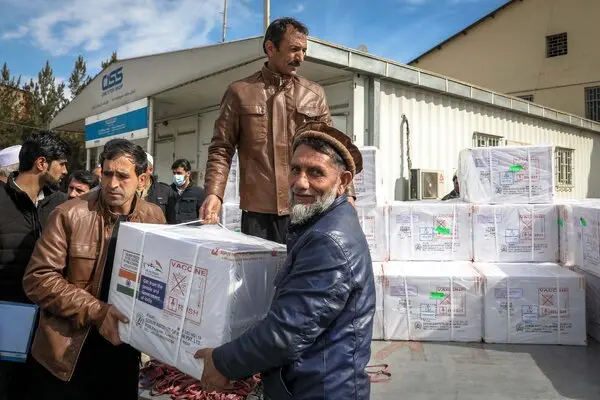
As the global race to vaccinate is underway, China, India, and Russia have shipped millions of vaccine doses abroad in an attempt to buy influence and goodwill.
China sees leading the global vaccination drive as an opportunity to change the narrative on COVID and forge friendly ties through the “health Silk Road.” India seeks to reassert its regional authority after years of watching China make diplomatic gains in South Asia. Vladimir Putin views his Sputnik V vaccine as a tool to bolster Russia’s international credibility. The three countries are eager to be philanthropic as a way of expanding their influence (and in the case of Russia and China, rehabilitating their reputations), each striking deals with large numbers of clients.
Their campaigns of self-interested altruism have become massive undertakings. As of Mon., Feb. 15, through grants and commercial purchases, China has shipped at least 46 million doses to countries including Turkey, Hungary, Indonesia, and Brazil, and India has shipped nearly 23 million to clients such as Nepal, Bangladesh, and Myanmar. Russia has also begun to ship doses of its vaccine to Venezuela and Argentina and, as of Feb. 10, has signed agreements to export nearly 205 million doses. (It is worth noting that there are outstanding questions regarding the efficacy of some of these vaccines. Surprisingly, given Russia’s dishonesty regarding COVID, its vaccine appears to be safe and effective.)
These countries are able to serve as benefactors due to their strong production capacity and lower domestic infection rates(China in particular). The U.S. and E.U., still reeling from devastating outbreaks, have focused on immunizing their own populations first. While the American-developed Pfizer and Moderna vaccines are being shipped abroad as well, the U.S. government is not currently donating them to allies or pursuing a concerted distribution campaign to expand American geopolitical power.

Credit: Our World in Data.
Should the international community encourage this vaccine diplomacy?
As usual, it’s complicated.
The global South is in desperate need of vaccines. According to the Economist Intelligence Unit, the developing world may have to wait until 2023 for widespread access. Inequitable vaccine distribution could double total global deaths and pose huge financial costs even to rich nations.
However, while vaccine diplomacy will do real good, there are also a number of reasons for hesitation:
First, China’s autocratic silencing of early pandemic prognosticators sparked the flames of the pandemic. Does Xi deserve credit for dousing some flames of a fire whose match he largely lit?
Second, there are lingering questions about some of the vaccines being distributed. For instance, a leading Chinese vaccine previously reported as 78% effective was later found to be 50.4% effective. In many cases, vaccines are being distributed before they’ve been approved by the COVAX international vaccination initiative. Is that wise, or safe?
Third, vaccine diplomacy is helping malign foreign powers expand their influence. Russia tested the Sputnik vaccine on humans before it was known to be safe, a grievous ethical violation. Beijing is committing a genocide against a racial minority and, in the words of Human Rights Watch, “sees human rights as an existential threat.” It’s important that global powers not brush aside these abuses in light of these countries’ vaccine exports.
On the one hand, Xi, Putin, and Modi are providing countries in need vaccines before international initiatives like COVAX can. On the other, people will be immunized in a potentially ineffective way that expands the power of bad actors. Is the trade-off worth it? It’s hard to say.



